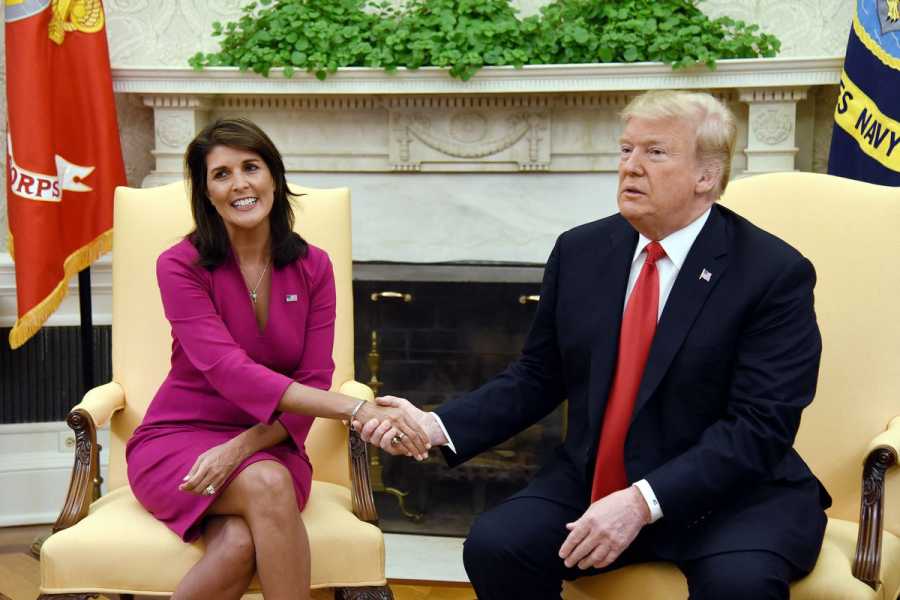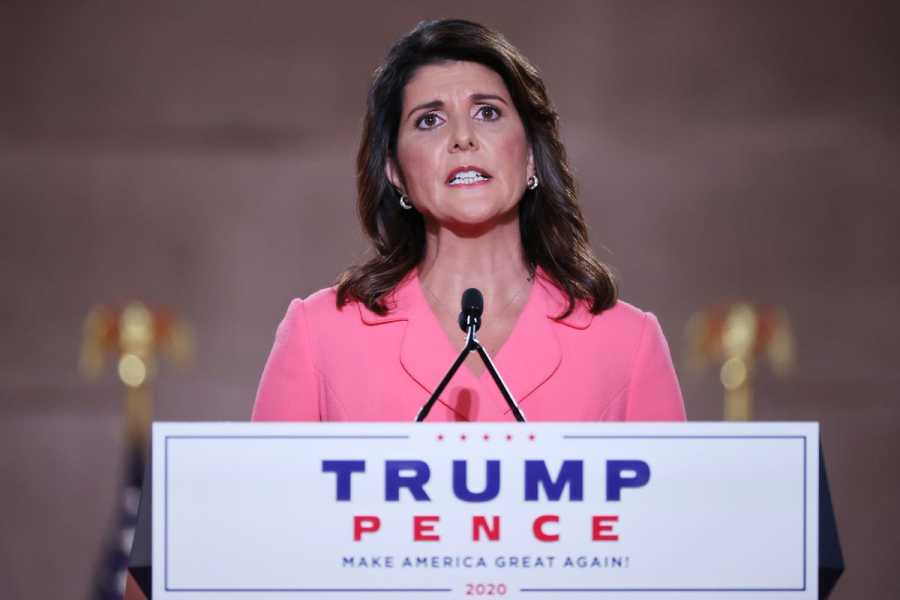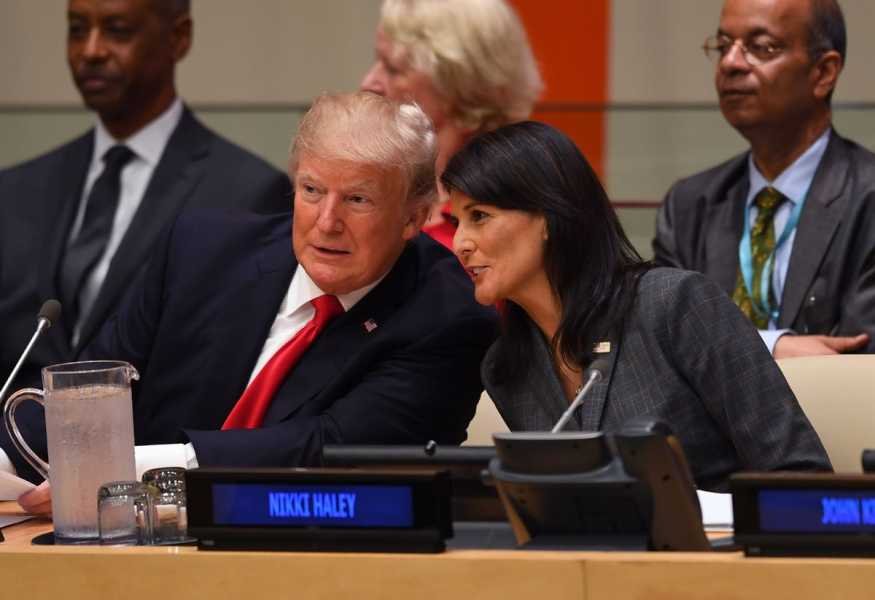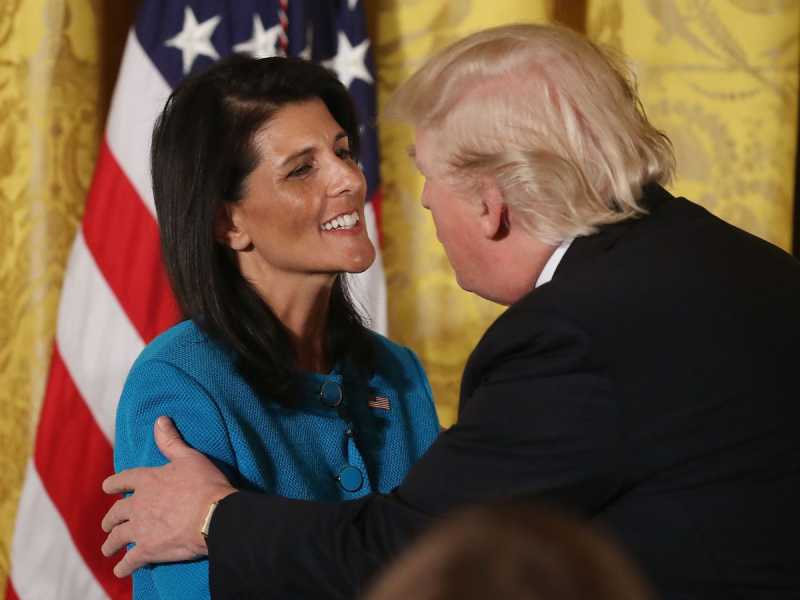Trump has more extreme plans for democracy and the power of the presidency. But on foreign policy, things get more complicated.

US President Donald Trump shakes hands with Nikki Haley, then the United States ambassador to the United Nations, in the Oval Office on October 9, 2018. Olivier Douliery/AFP via Getty Andrew Prokop is a senior politics correspondent at Vox, covering the White House, elections, and political scandals and investigations. He’s worked at Vox since the site’s launch in 2014, and before that, he worked as a research assistant at the New Yorker’s Washington, DC, bureau.
With Nikki Haley as the last remaining significant challenger to Donald Trump, media coverage of her has focused overwhelmingly on the question of whether she can win and on her gaffes. Skepticism about her prospects certainly makes sense, given Trump’s commanding poll leads.
Still, comparatively little attention has been devoted to the question of how the two would govern differently as president of the United States.
You might think the answer would be simple: Trump would be his unhinged self, and Haley would be more of a “normal” Republican. Trump would pose a dire threat to democracy and the rule of law, and Haley would not.
And that’s a big part of the story — arguably, most of the story. Trump doesn’t respect election results, can inspire mob violence like that of January 6, and wants to turn the Justice Department against his critics. None of those apply to Haley.
On domestic policy, reports suggest a second-term Trump would use executive power very aggressively to crack down on immigration and fire vast swathes of civil service employees, and perhaps to reshape US trade policy as well. There’s reason to doubt Haley would go so far on any of these issues.
The complication is in foreign policy. There, the combination of Trump’s erraticism and his “America First” instincts presents risks to global stability. But Haley has campaigned as the avatar of a hawkish GOP establishment that has been responsible for major foreign policy disasters. The current obvious area of contrast is that Haley staunchly supports Ukraine and Trump does not, but their differing instincts could play out in other yet-to-erupt conflicts in unpredictable ways.
Trump vs. Haley on democracy

Nikki Haley speaks during the Republican National Convention at the Andrew W. Mellon Auditorium in Washington, DC, on August 24, 2020. Chip Somodevilla/Getty Images/Bloomberg
It’s pretty obvious that President Trump would present a much greater threat to the continued functioning of American democracy than President Haley.
Trump, of course, tried to steal the 2020 election and keep himself in power despite his loss to Joe Biden. Such flagrant defiance of democratic norms is common in less developed democracies but something quite new in the United States — it’s a Trump special.
That tendency of Trump’s is made more dangerous by his ability to inspire supporters into mob violence, as demonstrated at the Capitol on January 6, 2021. It’s far less likely that anyone would storm the Capitol for Nikki Haley. Trump’s charisma is a powerful and dangerous thing.
Additionally, there’s the desire Trump has repeatedly expressed to pervert the Justice Department and launch (bogus) prosecutions against his critics and political opponents. He largely failed in these efforts in his first term, despite many attempts. But now that he himself is facing four indictments, including two from the DOJ, he’d likely go further in trying to wrest complete personal control of the department.
Haley, for her part, said on January 7, 2021, that Trump “was badly wrong,” and that “his actions since Election Day will be judged harshly by history.” The following month, she added,Trump’sti “He went down a path he shouldn’t have, and we shouldn’t have followed him, and we shouldn’t have listened to him. And we can’t let that ever happen again.”
But she soon made it clear she opposed impeaching and convicting Trump, saying, “Give the man a break.” She has been careful and measured in her criticism of Trump and will likely endorse him if he defeats her in the primary to preserve her future prospects in the GOP. So Haley isn’t exactly a champion of democracy — but she’s a normal Republican who wouldn’t actively try to shatter it, like Trump would.
Trump vs. Haley on foreign policy

US President Donald Trump and US Ambassador to the United Nations Nikki Haley speak during a meeting on United Nations reform at the UN headquarters in New York on September 18, 2017. Timothy A. Clary/AFP via Getty
The world of 2024 is a dangerous place. Conflicts in Ukraine and the Middle East are continuing, while tensions rise around Taiwan and the Korean peninsula. And Trump and Haley have sharply different instincts in how to deal with many of these crises.
Haley shows every sign of being a traditional Republican hawk — she sees the US as locked in conflict with China, Russia, Iran, and North Korea, and she wants to ramp up activity abroad and demonstrate “strength” against them. She wants to keep sending military aid to Ukraine and admit the country to NATO, while abiding by US commitments to defend South Korea and NATO allies in case of attack. She has also said she would defend Taiwan from any Chinese invasion.
Trump is no peacenik: He had a top Iranian general assassinated, talked of killing Syria’s president, escalated drone warfare, heightened tensions with China, and often made deranged-sounding threats. Like Haley, he’s staunchly supported Israel, been uncompromisingly hostile toward Iran, shown little interest in the Palestinian cause, and called for using the US military against Mexican drug cartels.
But he has been much less enthused about the US’s global leadership role generally and skeptical of US ground interventions. He’s refused to commit to continuing Ukraine aid, and he has long been much less eager for conflict with Russia, even talking of pulling the US out of NATO. He (unsuccessfully) sought a deal with Kim Jong Un and has talked of withdrawing US troops from South Korea. He launched a trade war against China, but then (unsuccessfully) sought a trade deal. And though he deepened US ties with Taiwan, it’s unclear whether he’d defend Taiwan militarily. His own appointees reined in his instincts on many of these issues, but it’s anyone’s guess whether that would still hold true in a second term.
So whose approach would be more likely to make the US — and the world — a better place?
With Haley, the risk is that she’d uncritically follow the hawks, when thinking like theirs has often led the US into disastrous overreach. There’s more to foreign policy than talking tough, and provocation can lead to escalation and military conflicts spiraling out of control. Nixon and Reagan were elected as hawks but eventually pivoted; Nixon built ties with Mao’s China and Reagan with Gorbachev’s USSR. We don’t yet know whether Haley is inclined to do anything similar.
With Trump, the risk is twofold. There’s his erraticism — the possibility that Trump, intending to threaten and bluff as he does, could end up blundering into war. But there’s also a risk to global stability if he follows through on his desire to withdraw the US from NATO or pull troops from South Korea. Current US policy in both arenas is intended as a deterrent, making Putin less likely to attack NATO countries and North Korea’s Kim less likely to attack South Korea, since it would mean war with the US. Troop withdrawals, in contrast, could be interpreted as a green light. And, as before World War II, the US might not find it so easy to withdraw from global conflict as America Firsters expect.
Which is more likely — that the US’s involvement abroad brings about global chaos, or that its newfound absence abroad causes global chaos?
Trump vs. Haley on domestic policy

US President Donald Trump greets UN Ambassador Nikki Haley during an event celebrating Women’s History Month in the East Room at the White House on March 29, 2017. Mark Wilson/Getty
On most domestic policy issues, Trump and Haley are pretty similar. They’re both hostile to Obamacare (though it’s unclear whether Republicans will take another swing at repealing it), they both love tax cuts, they’ve both jumped on the GOP bandwagon against trans people, and they’re both against abortion rights but are worried about how that will play in the general election.
One difference that has gotten some attention is that Haley has been a loud and proud supporter of Medicare and Social Security reform, or entitlement cuts — though she says her proposed changes would only impact younger workers. Trump has long claimed he wouldn’t cut either program — though he has occasionally hedged. But Haley would probably be more likely to prioritize the issue.
Any legislation that either would want to pass would depend on the situation in Congress. The key constraint there is less about Trump vs. Haley and more about whether Republicans control both chambers and, if so, how big their majorities are. Congress always constrains the president’s agenda, as Trump found out in his first term and Biden experienced when he took office.
There’s also the question of whether a Senate GOP majority would keep the filibuster, which effectively requires 60 votes for all bills except the special budget reconciliation process. Since it’s quite rare for one party to have 60 senators, that’s meant that measures that don’t affect taxes or spending need bipartisan approval to pass. Trump has long called for eliminating the filibuster, which could allow the GOP to enact a far more sweeping legislative agenda across many other issue areas. During his first term, Senate Republicans rolled their eyes at this demand, but Trump’s personality cult in the GOP has only strengthened since then, so it’s unclear how this would play out in 2025.
But the greatest domestic policy contrast would be on executive power, where Trump’s advisers have been shaping sweeping plans to use presidential authority to transform the immigration and trade systems as well as the federal government itself.
The New York Times reported in November on how Trump advisers like Stephen Miller have been planning what Trump promises will be “the largest domestic deportation operation in American history.” This would include building huge detention camps, reassigning many federal agents and deputizing local officers for sweeping immigration raids, trying to end birthright citizenship, and much more. He’d try to do it all through executive power — though the Supreme Court would hear challenges over all this.
Haley is no immigration dove. Asked during the US now, she said, “You have to deport them.” Yet she lacks the history of single-minded focus and fanaticism about this issue that Trump (and Miller) demonstrate.
On trade, Trump last year released a plan to impose tariffs on most imported goods, saying this could be a new 10 percent tax on imports. Though it’s meant to stimulate US industry, critics warn that other countries would retaliate and that it would drive up many prices for American consumers. A Trump trade adviser told the New York Times that he believed this could be done through executive authority, adding that Trump had not made a final decision on whether he’d seek congressional congressional approval.
Haley has praised Trump’s first-term actions on trade and called for more to be done to decouple the US economy from China. But some of her backers (like billionaire Charles Koch, whose political network has endorsed her) would prefer a return to the old free trade Republican consensus.
Trump aides have also floated what’s known as the “Schedule F” plan, which would use executive authority to reclassify thousands of career civil service officials in the federal government as political appointees who can be fired. Effectively, this would let Trump purge a big chunk of what he considers “the deep state” — eliminating lifetime appointees and nonpartisan experts (who Trump argues are biased against him) so he can replace them with MAGA true believers.
Haley, meanwhile, has said she would limit federal government officials to five years in the same job. On its face, this is even more sweeping than Trump’s plan, since it would apply to the entire federal bureaucracy — the Washington Post’s Catherine Rampell argued that it would “destroy the basic machinery of government.” But Haley has also been quite vague on specifics here, unlike Trump’s team, who are crafting a very precise plan that they told Axios Trump would put into action immediately. My own suspicion is that Haley’s proposal is campaign trail pandering to small-government conservatives that she wouldn’t follow through on once in office.
As governor of South Carolina, Haley did often push the envelope in expanding her executive power, repeatedly being checked by the courts. But Trump would likely be at a different level entirely — driven by his obsessions over immigration and the deep state, surrounded by radical advisers, and having spent the past three years consumed with resentment about how his first term ended. Given another four years in office, expect him to go much further.
Sourse: vox.com